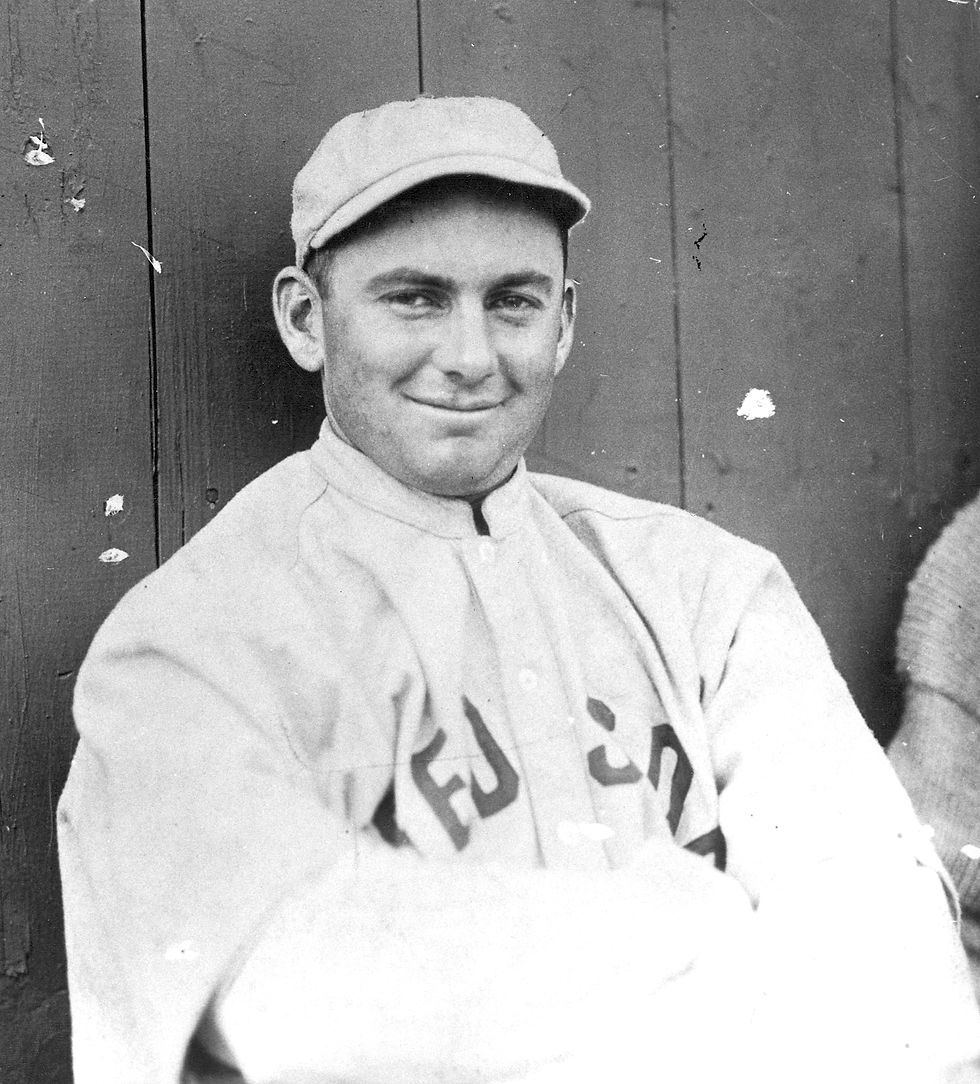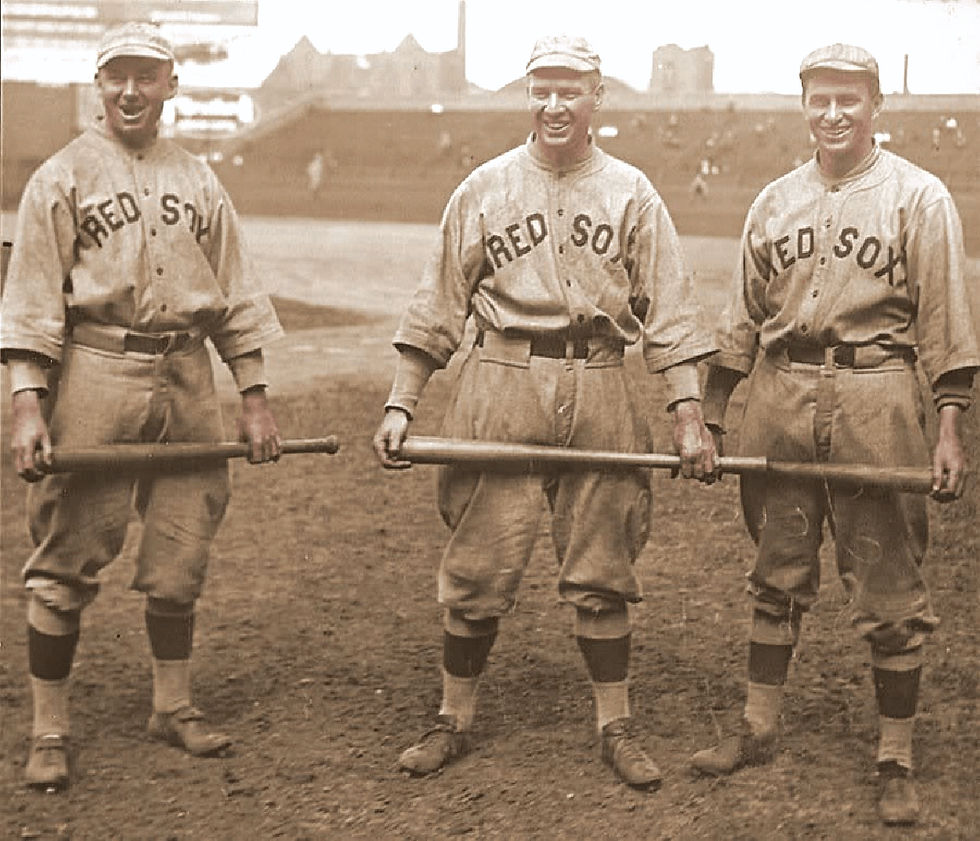Lewis, George E. (Duffy) (1975)
- Maine Baseball HOF

- Aug 12, 2019
- 4 min read
From Portland Press Herald ~ Maine Sunday Telegram 10/26/1975
Vern Putney Staff Sports writer
George E "Duffy" Lewis was left fielder on three world champion Boston Red Sox teams and manager of the Portland Mariners of the New England League in the late 1920's. A Salem NH resident, Lewis was the Sox left fielder on the 1912, 1915 and 1916 championship teams. Together with fellow outfielders Tris Speaker and Harry Hooper they formed what is said to be the best outfield ever in baseball. At 87, Lewis has prominently been mentioned as National Baseball Hall of Fame candidate and threw out the first ball for last Wednesday's historic game 6 of the 1975 world series. He also opened the Sox' 75th season last April with a ceremonial first pitch.
From Wikipedia
George Edward "Duffy" Lewis (April 18, 1888 – June 17, 1979), born in San Francisco, California, was a left fielder and right-handed batter who played Major League Baseball for the Boston Red Sox (1910–17), New York Yankees (1919–20) and Washington Senators (1921). Lewis attended Saint Mary's College of California.
Biography
Duffy Lewis, Tris Speaker and Harry Hooper — Boston's famous "Million-Dollar Outfield"
In Boston, Lewis belonged to the outfield trio which included Tris Speaker (CF) and Harry Hooper (RF) and is considered perhaps the best ever in fielding skill. At bat, Lewis was a renowned line-drive hitter who consistently finished in the top ten in most offensive categories despite a short career which was interrupted by World War I (Duffy served as a petty officer in the US Navy).
In 11 seasons, Lewis batted .284 with 38 home runs, 793 RBI, 612 runs, 1,518 hits, 289 doubles, 68 triples, and 113 stolen bases in 1,459 games. In three World Series covering 18 games for the Red Sox, Lewis posted a .299 average (20-for-67) with 8 runs, 1 home run and 7 RBI.
During his tenure in Boston patrolling left field, Fenway Park featured a ten-foot-high mound that formed an incline in front of the left field wall, now better known as the Green Monster. The young outfielder mastered the incline to such an extent that it was nicknamed "Duffy's Cliff". Sports cartoons of the period often depicted him as a mountain climber making catches amid sheep and snowcaps. The mound was eventually reduced in 1934, long after Lewis had left the Sox, and was not completely eliminated until the field underwent a major renovation following the 2004 season.
Duffy Lewis died in Salem, New Hampshire at 91 years of age. He was selected to the Boston Red Sox Hall of Fame in 2002.
From the Society for American Baseball Research
This article was written by Mark Armour
For decades after they last played together, the Boston Red Sox’ outfield of Duffy Lewis, Tris Speaker, and Harry Hooper, who toiled next to each other for six years in the Deadball Era, was often considered the greatest in baseball history. Although all three, especially Speaker, were fine hitters, their reputation was due largely to their exceptional defensive play. Lewis, the left fielder and the only one of the three not in baseball’s Hall of Fame, was long remembered for the way he played the incline at the base of Fenway Park’s left-field wall, a slope of grass that bore the name “Duffy’s Cliff.” Hooper thought Lewis was the best of the three “at making the backhand running catch at balls hit over his head.” A powerful left-handed batter, the 5-foot-10, 170-pound Lewis typically batted behind Speaker in the cleanup position, and often ranked among American League leaders in home runs and runs batted in.
OCTOBER 24, 2018 BY TOM CONMY
Pastime Portraiture: Duffy Lewis
https://behindthebag.net/2018/10/24/pastime-portraiture-duffy-lewis/
Here’s another Dodgers and Red Sox Series special, harking back to the 1916 variety, and Boston’s star left fielder and 3-time World Series champion (1912, 1915 and 1916), Duffy Lewis (photo from the legendary Bain Collection, in the Library of Congress).
Of those 3 titles above, Duffy sure earned his playoff shares in ’15 and ’16 – after only hitting .188 in the 1912 Classic (this despite 3 doubles, although he had 34 at bats in what turned out to be an 8 game series) and committing a key misplay in the field (see below), he led all Boston regulars in batting average in both the 1915 and 1916 World Series, along with many clutch performances. In 1915 he almost single-handedly won the Series by himself – batting .444 with 5 RBI in the 5 games, he had the walk-off winning single in Game 3, the eventual game-winning RBI in Game 4 and an 8th inning, game-tying 2-run HR in Game 5, as Boston beat Philadelphia 4 games to 1. He nearly repeated the feat in October 1916, batting .353 in 5 games, doubling in the first run of the Series in Game 1, successfully sacrificed over the eventual game winning run in the 14th inning of Game 2, giving Babe Ruth the victory, getting 2 hits and scoring 2 runs in Game 4 and tripling and scoring the first run in the decisive Game 5, as the Red Sox won their second Championship in a row.
Since 1912, Lewis was often tested more than the others due to having to contend with a quirk in new Fenway Park, a 10 foot rising hill along the left field wall (the future Green Monster), often done to meet the field level with the street level beyond. Lewis was so adept at playing this hill that it became known as “Duffy’s Cliff” in honor of his mastery in scaling it to track down deep fly balls.
Duffy Lewis is the only one of the “Golden Outfield” not to be elected to the Baseball Hall of Fame. However, he is a member of the Red Sox Hall of Fame, and was certainly indispensable to their Championships in 1915 and 1916. With only one more World Series title in the rest of the 20th century, his feats of October were long remembered by generation upon generation of Boston fans, and were not, or will not, soon be forgotten.














Comments